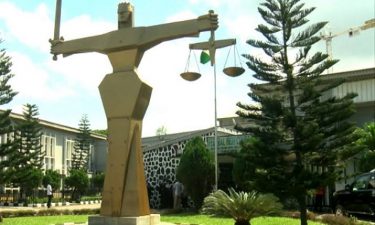*As Nigerian source challenges media on fairness, adequate information
By BASHIR ADEFAKA
Our source concluded, “If therefore you know, what stops the media sector of this country, Nigeria from simply playing their divine role of reporting to educate, inform the populace with right information and knowledge that we may all live in peace and progress in tranquility?” He asked.
The new religion based controversy being reopened currently in Nigeria has necessitated that some citizens dig into how similar cases are resolved in societies from which the local brewers of such controversies claim to take their religious ideology.
Recall a Nigerian lawyer recently dragged the Central Bank of Nigeria (CBN) and the Nigerian Army to court over what he called their portrayal of Nigeria as an Islamic state because of Arabic inscriptions on the local currencies and Army’s badge and logo, respectively.
Just before this, the nation was thrown into a controversy over the sentence to death in Kano of a Muslim singer, who blasphemed the Prophet of Islam, Muhammad Bin Abdullah, peace of Allah be upon him. Noteworthily, it was said that whereas the judgement was passed by Sharia Court in the Muslim populated Northern Nigerian state, the controversy was generated by media in Lagos and was spread to the rest of the South until the noise died down, when overcome by popular positions of Muslim scholars, Islamic jurists and organisations notably Muslim Rights Concern (MURIC), in the country.
Just after that, Nigeria that was still groping in the darkness of Coronavirus pandemic, like others in the world, was thrown into fresh – this time not just controversy but serious – mayhem occasioned by #ENDSARS protests in same Lagos, particularly, and was barely coming out of that when the lawyer came up with the issue of ‘Arabic inscriptions on Naira and Army’s badge.
Although the court in Lagos is yet to assign a date for hearing of the suit, pointers have been made to Arabic inscriptions even on currencies printed by the Bank of Israel and which is operated in Tel Aviv, Israeli capital, without Jews complaining and how the same inscriptions, over which a lot of dust is raised in Nigeria simply because of religious intolerance, were even a function of colonial Nigeria.
On Sunday 15 November, 2020 the attention of The DEFENDER was called to the judgement by a European court on human rights, which settled blasphemy of Prophet Muhammad peace of Allah upon him since 2018.
“I am one of the advocates of peaceful and united state of Nigeria. All these controversies are a disturbance to the peace of the nation and so must stop. I have called your attention to this because, you people in the Nigerian media always like to dodge such reality; things you know that your failure to report is causing lack of knowledge and religious intolerance in the country,” the source, who is not disposed to his identity being revealed, said.
Quoting his submission verbatim as sent from a media reports, The DEFENDER published:
“The European Court of Human Rights (ECHR) passed the verdict on Thursday 25 October 2018 that insulting Islam’s Prophet Mohammed will be a punishable offence and will not be counted under ‘freedom of expression’.
“But what about Europeans insulting Jesus Christ?
“ECHR said defaming or demeaning the Prophet “goes beyond the permissible limits of an objective debate” and “could stir up prejudice and put at risk religious peace”.
“The decision by a seven-judge panel came after an Austrian national identified as Mrs. S. held two seminars in 2009 in which she insulted the prophet.
“The court said that the woman’s comments could not be covered by the freedom of expression, stating that it had found that “the applicant’s statements had been likely to arouse justified indignation in Muslims” and “amounted to a generalization without factual basis.”
“An Austrian court convicted her of disparaging religious doctrines in 2011 and fined her 480 euros (548 dollars), a judgment that was upheld on two appeals.
““Mrs. S. appealed but the Vienna Court of Appeal upheld the decision in December 2011, confirming, in essence, the lower court’s findings. A request for the renewal of the proceedings was dismissed by the Supreme Court on 11 December 2013,” it said.
““Relying on Article 10 (freedom of expression), Mrs. S. complained that the domestic courts failed to address the substance of the impugned statements in the light of her right to freedom of expression.”
“On today’s ruling, the ECHR said it “found in particular that the domestic courts comprehensively assessed the wider context of the applicant’s statements and carefully balanced her right to freedom of expression with the right of others to have their religious feelings protected, and served the legitimate aim of preserving religious peace in Austria.””
Our source concluded, “If therefore you know, what stops the media sector of this country, Nigeria from simply playing their divine role of reporting to educate, inform the populace with right information and knowledge that we may all live in peace and progress in tranquility?” He asked.




